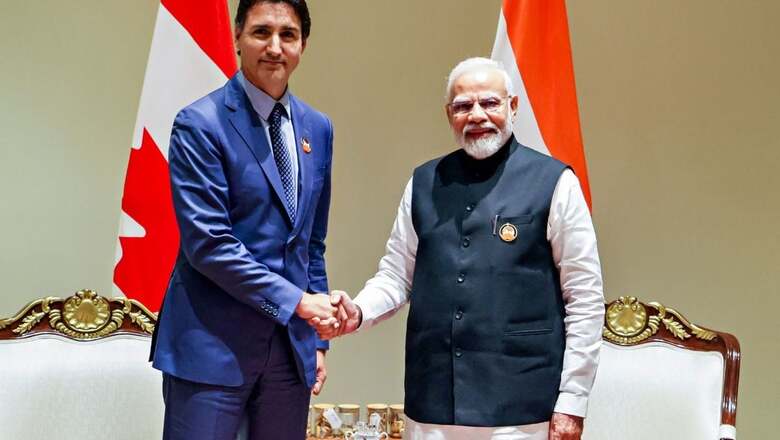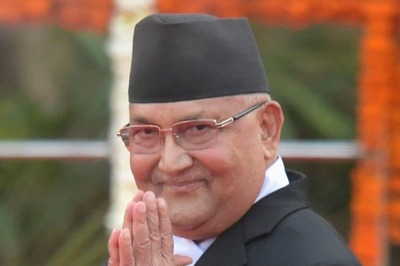
views
In a surprising turn of events, Canada announced a temporary halt to its negotiations on a proposed trade treaty with India, just three months after both nations expressed their intent to finalise an initial agreement within the same year. This unexpected pause comes after years of on-and-off discussions dating back to 2010 concerning a Comprehensive Economic Partnership Agreement between Canada and India. While the talks were formally relaunched in the previous year, India’s envoy to Canada, Sanjay Kumar Verma, claimed that Ottawa had requested the delay “within the last month”, although he did not indicate why.
The announcement of a temporary halt came shortly before Canadian Prime Minister Justin Trudeau’s disastrous India visit for the G20 summit.
Previously, in May, India and Canada openly stated their intention to complete an Early Progress Trade Agreement this year. This pact aims to boost commerce, encourage additional investment, and develop dispute resolution systems. Despite the lack of a clear explanation for the pause, Verma acknowledged Canada’s request, stating, “I’m not sure what the reason is. But there is an honest request from the Canadian side, and we have no reason not to accept it.”
One probable reason for Canada’s decision, according to Verma, could be the need for more time to thoroughly enlighten its sector organisations about the complexities of the proposed trade deal. It is worth noting that in May of the same year, India’s Minister of Commerce and Industry, Piyush Goyal, flew to Canada and met with his Canadian counterpart, Mary Ng. During these discussions, both sides expressed optimism about the current state of the agreement, with Ng claiming that the two countries were getting closer to signing it.
The recent pause in trade talks between Canada and India has raised questions about the future of their bilateral relations, particularly because of the commitment both countries showed earlier in the year to seal an Early Progress Trade Agreement (EPTA). After years of negotiations and renewed efforts, the two nations find themselves at a crossroads in their economic partnership. It, thus, becomes imperative to delve into the events leading up to this pause, the potential prospects that lie ahead, and the strategic consequences for both countries, in order to build a case for the reopening of talks and the signing of CEPA.
Building a case for CEPA
India and Canada began negotiations for a Comprehensive Economic Partnership Agreement (CEPA) in 2010. Despite the significant Indian diaspora in Canada, trade links between the two nations remained stagnant. Imports from India made up less than 1% of Canada’s total imports, and Canada’s share in India’s imports only merely exceeded 1% in 2015-16. In 2008, the India-Canada CEO Round Table suggested formalising CEPA to improve trade by eliminating tariffs and increasing economic collaboration.
While negotiations started in 2010, differences in negotiating approaches and contentious issues put the CEPA negotiations on hold in 2017. However, in 2022, both countries agreed to relaunch negotiations and consider an EPTA as a first step towards a comprehensive agreement. The rationale was to focus on areas of convergence before proceeding to a full-fledged free trade agreement (FTA).
In its Indo-Pacific Strategy, Canada has identified India as a crucial partner, emphasising their common commitment to a rules-based international system. Both countries recognise the importance of addressing common concerns, such as trade with China. In this regard, the proposed EPTA and CEPA could strengthen their strategic ties.
Economic Cooperation
In the ever-evolving landscape of international trade, several developed economies, including Australia, the United States, the United Kingdom, and the European Union, have been actively engaging with India to forge lucrative trade agreements. These countries have recognised India’s enormous market potential as well as the strategic imperative of building strong economic connections with the world’s largest democracy.
For the longest time, India was regarded as a protectionist and reluctant FTA participant. However, in recent years, India has been actively negotiating free trade agreements with a number of nations, including the UAE and Australia.
Recent trade agreements demonstrate the Indian government’s proactive attitude to trade negotiations. A good example is the India-UAE Comprehensive Economic Partnership Agreement (CEPA), which went into force on May 1, 2022. This deal is expected to boost bilateral merchandise trade to a remarkable C$128.3 billion by 2026, up from C$88.2 billion in 2021. Notably, the UAE demonstrated its commitment to this collaboration by lowering import tariffs on 80% of its tariff lines, which accounts for a whopping 90% of India’s exports to the UAE. In return, India removed duties on 64.6% of the UAE’s exports to India. Surprisingly, this entire agreement was concluded in a mere 90 days, demonstrating India’s willingness to expedite trade negotiations even in the face of difficulties.
The Australia-India Economic Cooperation and Trade Agreement (ECTA), signed in April 2022, is another notable example. Although Australia has yet to ratify it, this deal promises to more than double bilateral trade to C$56.8 billion by 2026, up from C$28.4 billion in 2021.
India stands to benefit significantly from this agreement, gaining access to a more cost-effective supply of raw materials, including coal, metallic ores, and critical minerals. These resources are integral to India’s export-oriented manufacturing industries, facilitating their growth and competitiveness on the global stage. Under the terms of the ECTA, Australia has pledged duty-free access to 96.4% of Indian exports to Australia, encompassing textiles, footwear, and pharmaceuticals. In reciprocation, India has committed to removing duties on 85% of tariff lines for Australian exports. This ground-breaking agreement, India’s first trade deal with a developed nation, demonstrates the country’s willingness to form long-term economic partnerships with complementary markets.
As these global players race to strike deals with India, it becomes clear that Canada, too, must embrace the opportunity and sign a comprehensive economic partnership agreement (CEPA) with India. By doing so, Canada can unlock untapped trade opportunities and secure a formidable foothold in one of the most strategically significant regions globally.
In this dynamic and rapidly evolving global trade landscape, Canada must recognise the significance of these developments. By actively pursuing a CEPA with India, Canada can align itself with the changing trade dynamics and tap into the vast potential offered by India’s burgeoning market. The strategic implications of such a partnership are significant, positioning Canada as a key player in one of the world’s most strategically important regions.
Conclusion
While Canada and India have faced challenges and delays in their trade negotiations mainly due to diverging views and domestic pressures, the potential benefits of a CEPA far outweigh these roadblocks. A successful agreement could significantly boost bilateral trade and create export opportunities for both countries. As Canada seeks to diversify its trade beyond the U.S. and China, India emerges as a crucial partner.
Thus, it is in both Ottawa and New Delhi’s best interests for the negotiations to resume as soon as possible as the future of Canada-India trade ties looks promising, and the EPTA and CEPA could have a key role in shaping this economic cooperation. Both nations have the opportunity to leverage their historic ties and mutual interests to create a prosperous future for their economies and people. But for that, first of all, the Canadian leadership will have act against anti-India forces operating on its soil. Till then it will remain a relationship of missed opportunities.
Esha Banerji is presently associated with a premier think-tank in India, specialising in defence, security, and strategic studies. Her research interest and focuses of analysis are defence strategy, geo-economics, foreign affairs, and the implications of Chinese security developments on the region, especially India. Views expressed in the above piece are personal and solely that of the author. They do not necessarily reflect News18’s views.



















Comments
0 comment